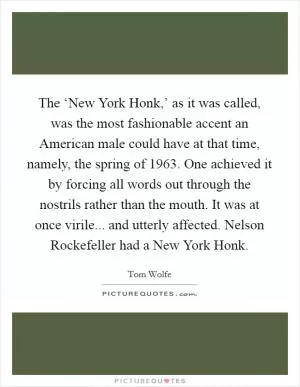Even hostile parodies admit from the start that the target has a distinct voice

Even hostile parodies admit from the start that the target has a distinct voice
Tom Wolfe is a renowned American author and journalist known for his distinctive voice and style of writing. His works often blend journalism with fiction, creating a unique and engaging narrative that captures the essence of American culture. Wolfe's writing is characterized by his use of vivid language, detailed descriptions, and satirical humor, making him a target for parody and criticism.Even hostile parodies of Tom Wolfe's work cannot deny the fact that he has a distinct voice. His writing is instantly recognizable, with its sharp wit, colorful characters, and keen observations of society. Wolfe's style is often imitated but never truly replicated, as his voice is truly his own. Parodies may seek to mock or criticize Wolfe's writing, but they ultimately acknowledge his talent and originality.
One of the most famous parodies of Tom Wolfe is the novel "Bonfire of the Vanities" by Jay McInerney. While McInerney's novel is a satirical take on the excesses of Wall Street in the 1980s, it also pays homage to Wolfe's distinctive style. The novel features a similar cast of characters, sharp social commentary, and a fast-paced narrative that echoes Wolfe's own work. Despite its critical stance towards Wolfe, "Bonfire of the Vanities" ultimately serves as a testament to his influence and impact on contemporary literature.
Another example of a hostile parody of Tom Wolfe is the novel "I Am Charlotte Simmons" by Tom Wolfe himself. In this novel, Wolfe takes aim at the culture of college campuses and the behavior of young adults, using his trademark style of satire and social commentary. While the novel may be seen as a critique of modern society, it also showcases Wolfe's unique voice and perspective on the world.












 Friendship Quotes
Friendship Quotes Love Quotes
Love Quotes Life Quotes
Life Quotes Funny Quotes
Funny Quotes Motivational Quotes
Motivational Quotes Inspirational Quotes
Inspirational Quotes